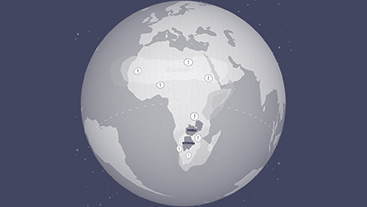The economic impact of El Niño-related floods and drought on small and medium enterprises in Botswana, Kenya and Zambia

Since 2016, the Grantham Research Institute has been investigating the impacts of the 2015/16 El Niño event on parts of eastern and southern Africa.
The following project outputs are now available:
- Video
- Policy brief
Climate risks to hydropower supply in eastern and southern Africa - Journal papers
– Business experience of floods and drought-related water and electricity supply disruption in three cities in sub-Saharan Africa during the 2015/2016 El Niño. Global Sustainability 1, 2018
– Hydrological response and complex impact pathways of the 2015/2016 El Niño in Eastern and Southern Africa. Earth’s Future 6(1), 2018
– Hydropower plans in eastern and southern Africa increase risk of concurrent climate related electricity supply disruption. Nature Energy 2, 2017 - Commentaries
– How can Africa’s SMEs become more resilient to climatic disruption?
– Hydropower in Africa: Plans for new dams could increase the risk of disruption to electricity supply
– As Southern Africa faces new urban drought challenges, who is heeding the wake-up call?
Why investigate this El Niño event?
El Niño is commonly linked to droughts in southern Africa and extreme rainfall in eastern Africa. Given climate projections that suggest an increased likelihood of extreme weather events in the future, the occurrence of one of the most severe El Niños on record in 2015/16 represented an important moment for learning about building resilience to rainfall variability.
Drought and flooding in sub-Saharan Africa are often considered most closely in relation to risks to agriculture. But increasing urbanisation is changing the nature of climate risk in the region. In this project, we focus especially on the impacts of disruption to water and hydroelectricity supplies and urban flooding, particularly for small businesses.
The project’s conclusions aim to inform and support action to reduce the risk of climate-related disruption to urban infrastructure and economic activity across the region.
Research focus
The project has examined the impacts of the 2015/2016 El Niño on rainfall, river flows and lake levels in Botswana, Zambia and Kenya, and the consequences for local populations, especially micro, small and medium enterprises (MSMEs) in the respective capital cities. This focus was chosen because in Africa’s rapidly growing cities, MSMEs are key drivers of economic growth and a significant source of employment.
Within each country the specific research focuses were:
- Botswana: Water supply disruption
- Zambia: Impact of temporary outages (‘load shedding’) of electricity supplied by hydropower
- Kenya: Flooding
The project also considers climate risk for hydropower more broadly in sub-Saharan Africa, since dependency on hydropower electricity generation is set to grow on the continent.
This research was conducted in partnership with the University of Barotseland, the University of Nairobi and the Botswana Institute for Technology Research and Innovation.
This research has been funded by the UK Natural Environment Research Council (NERC), grant ref. NE/P004784/1, and the Department for International Development (DfID).

